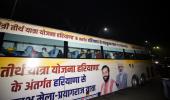How have aspirations, ambitions and hopes broken down for these young men from the most advanced parts of India? asks Mihir S Sharma.

American President Donald Trump certainly believes that one of the significant contributors to the mandate he received in the United States elections last year was his promise to crack down on illegal immigration to that country.
There is a strong perception there -- which is, to an extent, backed up by official data -- that the number of people crossing the border without the proper papers increased sharply after 2020.
The degree to which the previous administration of President Joe Biden bears responsibility for this can be debated.
But illegal migration has now become the sort of political lightning rod in the US that it has been for some time in many European countries, including Germany and Hungary.
There are many ideas on how to deal with this among the self-styled leaders of the Trump coalition, and it is possible that the President will try them all one by one.
He has already issued an executive order attempting to curtail the right of citizenship assigned to all those born on US soil -- so called 'birthright citizenship' has long been taken for granted in the US, but it has become increasingly politically controversial.
Whether attempts to remove this right will be regarded as constitutional is an open question -- although the rightward lurch of the US supreme court might give the Trump administration some comfort.
He has also moved swiftly on trying to deport some illegal migrants. 'Mass deportation' was promised by some on the extreme right of the Republican party, and viewed with dread by many others.
Identifying all the millions of American residents who are without the proper paperwork -- some of whom have been in the US for decades -- and then deporting them would certainly be immensely disruptive, both politically and economically.
It is not even certain that the federal government has the resources and capacity for such a task, leave alone whether a genuine political consensus exists for it.
But Mr Trump will have to satisfy his voters that he is acting, and thus some deportations are inevitable.
It should be noted that this is in itself not an unusual act.
Governments of all political stripes have been pushed into such actions by their voters.
Even centre-left governments like that of the Labour party in the United Kingdom have tom-tommed so-called deportation flights.
Prime Minister Keir Starmer even accused his right-wing predecessors of running an 'open borders experiment', similar to accusations that Mr Trump has levelled at his opponents.
Unfortunately, therefore, India will have to be prepared to receive deportation flights.
The ruckus in Parliament following what purports to be leaked video of one such flight cannot be sustained over the length of Mr Trump's term.
A political consensus will need to evolve on how India deals with the fact that it has become in recent years a major source of illegal migration.
By some estimates, the 'donkey route' from India has provided the largest number of illegal migrants to the US after Mexico, a number that runs into the hundreds of thousands.

There is no doubt that if deportations are carried out, they should be done as humanely as possible.
There is little need to handcuff people who are in custody, for example, unless they have been demonstrated to be individually dangerous.
The last set of returnees was brought over in a military aircraft as well, which unnecessarily securitises what should be a straightforward civil procedure.
But, as External Affairs Minister S Jaishankar pointed out in Parliament, we now have to take the problem of trafficking seriously.
In parts of the country it is barely an underground activity any more but instead something semi-respectable, bringing in crores of revenue a year.
Such a state of affairs cannot be allowed to continue. It would endanger India's foreign policy priorities as well as reduce the scope for legal and temporary migration of the sort that provides vital remittances.
But some uncomfortable questions will also be asked. For example, it seems clear that many of those who are being returned from the US are not exactly people completely cut off from economic prospects within the country.
They are often from prosperous parts of the country, and are able to lay their hands on tens of lakhs of rupees -- whether through formal or informal credit or family savings -- in order to pay off the traffickers.
Why do they nevertheless choose this dangerous path?
Perhaps it is understandable that most of them are from Punjab, where ex-migration has become a way of life.
But how come a significant proportion is from Gujarat, which we have been led to understand has been prospering for decades
How have aspirations, ambitions and hopes broken down for these young men from the most advanced parts of India
The more flights Mr Trump runs back to India, the more urgent these questions become.
Feature Presentation: Aslam Hunani/Rediff.com












 © 2025
© 2025